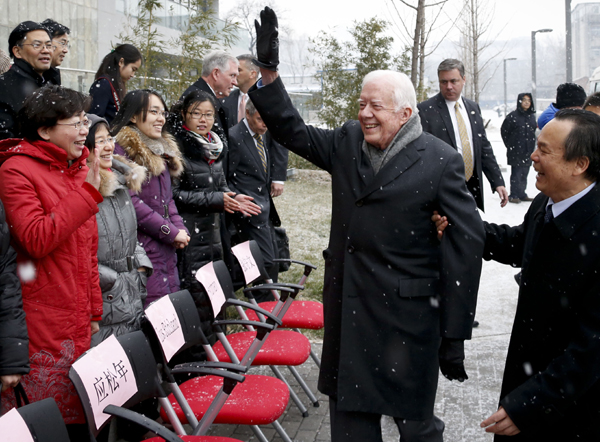Chinese and foreign experts have urged legislators to turn a regulation on government transparency into law as part of efforts to combat corruption.
Experts, including former US president Jimmy Carter, spoke at a forum on government transparency organized by Peking University and The Carter Center on Wednesday. Many experts agreed that the range of government affairs that are publicly disclosed should be broadened, placing those in power under stricter public scrutiny.
 |
|
Former United States president Jimmy Carter waves to a group of people before taking a picture with them in Beijing on Wednesday. Carter visited Peking University on Wednesday and made a speech at a seminar organized by the university and The Carter Center. [Photo by KUANG LINHUA / CHINA DAILY] |
China currently has an administrative regulation on government transparency, which means violators, officials who refuse to disclose information, are usually exempt from legal responsibility or severe punishment.
Carter said the regulation should be upgraded into a law that everyone must obey.
Although the regulation, enforced since 2008, has had some success in fighting corruption, certain Chinese officials have taken advantage of loopholes to hide information and protect their own interests, he said. "China needs an open government. Anti-corruption work still has a long way to go."
China can become an example to the world, proving that an open government can have a harmonious relationship with its people, he added.
Ma Huaide, a law professor at China University of Political Science and Law, said if the regulation becomes a law, it will be more powerful.
Currently, the administrative rule has a lower legal position than laws and must sometimes be set aside in matters that overlap with government transparency laws, including Civil Servant Law and Archive Law.
Ma said there are no specific details on what kind of information should be disclosed by the government under the current regulation.
"Officials should disclose their properties at once instead of being asked to do so," he said. "In some previous cases, officials wearing luxury watches published details of their property only after university students questioned them and applied for disclosure."
He said if the government can disclose information on its own initiative, corruption will be alleviated.
"In the regulation, ‘open' has not become a principle. That is to say, the government has some room to choose what kind of information it can hide," said Yang Weidong, a law professor at the Chinese Academy of Governance.
When information involves state and business secrets, officials' privacy, or may be dangerous to social stability, it will not be disclosed, he said. But some administrations are using these terms as excuses to not disclose information.
Yang said officials often claim there is no information available, or it is not part of their duties to publish the information. This can negatively affect the development of an open government in the country, he added.
Jiang Ming'an, a law professor with Peking University, said the time is right to define what kind of information may affect social stability, otherwise the effect of disclosure will be weakened.
He said the best way to curb corruption still lies in the structural reform of management.
"Opening up government information can contribute to the anti-corruption drive, but it is not the key," he added.
Klaus Rohland, World Bank representative for China, Mongolia and South Korea, agreed with Jiang. He said stamping out corruption is a long-term goal, and it took the US government more than 60 years to see results when it did it.
Anti-corruption efforts should start with the government decision-makers becoming known to the public so they can be held accountable in public forums such as micro blogs in China and Twitter in the US, Rohland said.
"The public has right to know what's going on (in their country)," he added.
